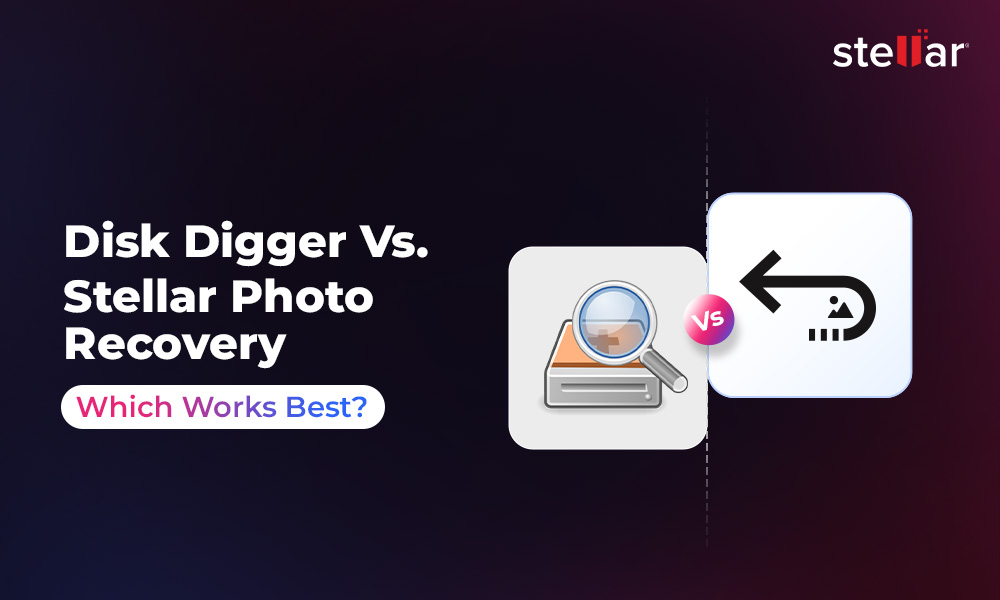Flash memory cards happened to solve a problem that held back imaging technology for decades. In the late 90s, when hard drives weren’t handy for mobility, and floppy disks lacked storage space, even for a few pics, these tiny, high-speed storage flash memory cards arrived.
Based on NAND flash technology known for its high-capacity, cost-effective storage, flash memory cards allowed users to carry thousands of photos in their pockets and swap them between devices, providing both mobility and storage.
But as these cards became popular among camera and smartphone users, new problems emerged, such as losing data from flash memory cards. Whether your SD card is corrupt, or you are unable to access your lost files from a microSD card, losing photos from a portable flash memory card can really put you behind.
However, recovering photos from various flash memory doesn't have to be a headache. In this comprehensive article, we'll discuss the simple steps to recover photos from different types of flash memory cards, including SD, SDHC, SDXC, CF, MMC, Smartmedia card, etc. With our expert tips and solutions, you'll be able to safely get back any lost or deleted photo from your digitally secured cards.
Types of Flash Memory Cards – How They Are Used?

Each type of flash memory cards is build different, for different purposes, and for different devices. The most common ones are:
- SD (Secure Digital) Cards: The most popular flash memory cards, with standard SD, and microSD sizes. They have other variants, such as SDHC (Secure Digital High Capacity), SDXC (Secure Digital Extended Capacity), and SDUC (Secure Digital Ultra Capacity), which support larger capacities and other file systems. SD cards are found in cameras, mobile phones, tablets, and other consumer electronics.
- microSD Cards: A miniature version of SD cards, widely used in smartphones, tablets, action cameras, and drones. They provide similar capacity options as SD cards, such as microSDHC, microSDXC.
- CompactFlash (CF) Cards: Larger cards commonly employed in professional cameras and industrial uses as they have large capacities and fast data transfer rates.
- Memory Stick Cards: Created by Sony, these were used in Sony cameras, camcorders, and PlayStation Portable gadgets. There are extensions like Memory Stick Duo, Pro Duo, and the rest, but their popularity decreased with the advent of SD cards.
- MultiMedia Card (MMC): An older and outdated format, equivalent to SD cards, utilized in early digital cameras and mobile devices. It was widely replaced by SD cards, but still remains in legacy devices.
- xD-Picture Card: Only found on some older Olympus and Fujifilm digital cameras.
- SmartMedia Card: A thin flash memory card, which has become obsolete now. You need a special type of smart media card reader or adapter to access these cards now.
- CFast and CFexpress Cards: Fast cards are used for professional photography and video work, they offer higher read/write speeds than the older CF cards.
- Universal Flash Storage (UFS) Cards: Looks similar to SD cards, although different and more advanced, UFS cards are a newer generation of SD cards, with faster data transfer rates, used in some high-end tablets and smartphones.
- Embedded MMC (eMMC): Not a removable card, but a kind of flash storage soldered onto device motherboards, used extensively in smartphones and tablets.
- Other Specialized Types: Such as SxS cards (only found on high grade professional video cameras), Nano Memory (NM) cards (in some Huawei phones), and others.
Methods to Recover Photos from Different Flash Memory Cards
Modern flash memory cards (SD, microSD, CF, MMC, UFS, etc.) store images in a wide range of formats, from standard JPEG, PNG to complex RAW files. These cards are used in everything from DSLRs and drones to smartphones and action cameras, making photo loss a riskier and challenging situation for users.
While backups act as a savior for many, what if you don’t have one in place. Also, manual photo recovery methods, such as using recycle bin, fixing file attributes, using built-in OS tools and functions, often fall short, especially when dealing with various types of flash memory cards, or while recovering specialized RAW photo formats.
If you are looking to recover your lost or deleted photos from a flash memory card, such as SD card, microSD cards, compact flash, memory stick and others, it can be accomplished using a specialized data recovery tool. But before that, remember, not to save any new files or format the memory card (SD, microSD, MMC, etc.) after data loss, as this can overwrite recoverable data. Also, you need a high-quality and compatible connector adapter to connect your device to a computer system.
Try Stellar Photo Recovery Tool
Many basic recovery tools either lack support for photo file types, fail to recover from severely damaged cards, or require technical expertise that puts them out of reach for everyday users. Stellar Photo Recovery can help you recover lost or deleted photos stored in any format from a flash memory card.
Stellar Photo Recovery tool is a professional-grade photo recovery software tailored specifically for photo recovery. It supports a huge range of file formats, including JPEG, PNG, TIFF, and RAW files from all major camera and storage device manufacturers. It can recover photos from SD/microSD, CF, xD, USB drives, SSDs, and other media storage drives.
The software’s advanced scanning algorithm can recover not just photos, but also videos and other document types if you need to. It's got a simple, easy-to-use interface that makes the whole process super easy, even if you're not a tech expert.
One of the best things is that it can work with massive storage drives, up to 18 terabytes. So whether you need to recover from a small SD card or a massive external hard drive, Stellar Photo Recovery has got you covered.
The tool is specifically designed with photographers in mind. All you have to do is:
- Download and install Stellar Photo Recovery on your computer.
- Connect your flash memory card or USB drive to the computer and then select what to recover.

- In the Recover From page, select your storage device from the list.

- Click "Scan" to search for lost or deleted photos. You can also toggle enable the Deep Scan feature for a thorough scan of your storage drive.
- Preview the listed images and select those you want to recover.

- Click "Recover" and save the files to any desired location of your choice.
Stellar Photo Recovery offers great versatility, and device compatibility, supporting all major storage brands, including SanDisk, Kingston, Samsung, Lexar, and many more. It also offers a powerful Deep Scan feature for recovering all files, and the ease of use makes it a top choice for anyone.
Best Practices to Prevent Data/Photo Loss on Flash Memory Cards:
- Always use the "safely remove" or "eject" function in camera, smartphone or computer devices before removing a flash memory card.
- Avoid exposing cards to moisture, fire, dirt, dust, and extreme temperatures.
- Do not use low-quality or unbranded flash memory products.
- Rotate usage among several cards if you frequently write/delete data.
- Regularly back up important data stored on flash memory devices.
- Scan your memory card with a reliable antivirus every week.
By following these best practices, you can significantly reduce unintentional data deletion or loss from flash memory cards.
Wrapping Up:
Each flash memory card, be it SD, microSD, UFS, CF, or MMC, can encounter unique issues, such as deep corruption, formatting, or other physical or technical faults, where manual steps like basic file restoration, command-line utilities, or built-in OS tools may not be effective. For instance, the manual techniques to recover deleted photos from SD card, may not work for MMC, or CF cards. Additionally, manual recovery can be time-consuming, may require technical expertise, and does not always support the broad range of photo formats (e.g., RAW) stored on these cards.
Given these challenges, Stellar Photo Recovery is the best, because it offers a reliable, user-friendly, and comprehensive solution that works seamlessly across all major flash memory card types, irrespective of the cause or complexity of data or photo loss.













 9 min read
9 min read







